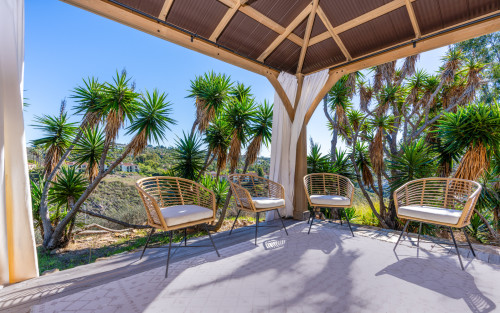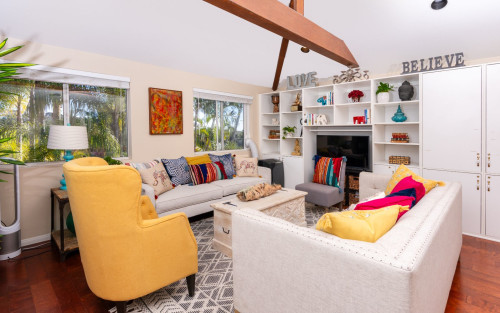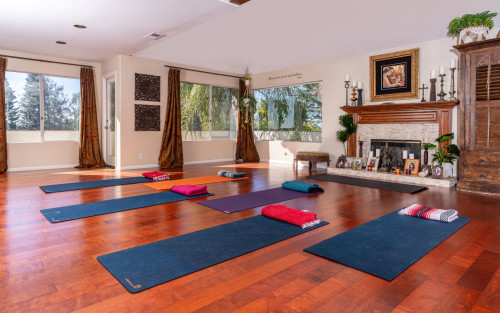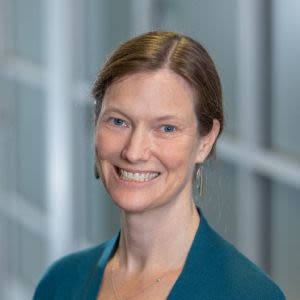






Villa Kali Ma - Holistic Treatment Centers for Women
Verified Center
This provider's information has been quality-checked by Recovery.com's Research Team for accuracy and completeness, including center verification through appropriate third-party organizations.
Treatment Focus
This center treats substance use disorders and co-occurring mental health conditions. Your treatment plan addresses each condition at once with personalized, compassionate care for comprehensive healing.
Primary Level of Care
Offering intensive care with 24/7 monitoring, residential treatment is typically 30 days and can cover multiple levels of care. Length can range from 14 to 90 days typically.
Treatment Focus
This center treats substance use disorders and co-occurring mental health conditions. Your treatment plan addresses each condition at once with personalized, compassionate care for comprehensive healing.
Primary Level of Care
Offering intensive care with 24/7 monitoring, residential treatment is typically 30 days and can cover multiple levels of care. Length can range from 14 to 90 days typically.
Provider's Policy
Villa Kali Ma does not accept Medi-Cal, Medicaid, Medicare, or state-funded policies. Villa Kali Ma is an in-network provider with Healthnet, Anthem BCBS, Multiplan, Halcyon and First Health. They are currently accepting most insurance plans that have PPO or out-of-network benefits. Private Insurance Accepted.
Villa Kali Ma - Holistic Treatment Centers for Women
Villa Kali Ma - Holistic Treatment Centers for Women
About Villa Kali Ma - Holistic Treatment Centers for Women
Villa Kali Ma offers recovery for women who struggle with substance use and co-occurring mental health disorders. They provide all levels of care: detox, inpatient, intensive outpatient, and partial hospitalization. Their treatment programs bring deep healing and transformation to women’s lives by teaching reliable, tried, and true paths to live in health and joy.
Find Wholeness with a Blended Approach
Villa Kali Ma’s signature approach to healing uses paths from East and West to guide women to look further within, beyond their biggest pain and fear, to discover their true essence. Treatment programs include individual, family, and group therapy to help clients heal their thoughts, habits, and emotions. They also provide chances to heal the body and spirit through physical wellness practices, self-discovery journeys, and connection with others and the earth.
Prevent Relapse with Aftercare & Alumni Support
Villa Kali Ma helps clients develop a toolbox of recovery practices and a realistic plan for successfully returning to daily life after treatment. They also offer weekly online alumni group sessions led by their primary therapists, as well as in-person alumni events, meetings, and workshops throughout the year.
Fully Immerse in Comfort & Serenity
Villa Kali Ma’s residential treatment center is situated in a hillside home on over an acre of land surrounded by beauty. Clients stay in private or shared guest suites with ensuite bathrooms and queen or full-size beds adorned with plush linens. Two of the rooms have ocean views, and one has its own large private patio that leads out to the labyrinth and garden. During free time, clients enjoy the tranquility of the poolside cabana, walks around the labyrinth, time in the garden, or the meditation room.
Highlights from the Center
Highlights
These highlights are provided by and paid for by the center.
Equine Therapy
Certified Professionals
Women Only
Center Overview
Treatment Focus
This center treats substance use disorders and co-occurring mental health conditions. Your treatment plan addresses each condition at once with personalized, compassionate care for comprehensive healing.
Joint Commission Accredited
The Joint Commission accreditation is a voluntary, objective process that evaluates and accredits healthcare organizations (like treatment centers) based on performance standards designed to improve quality and safety for patients. To be accredited means the treatment center has been found to meet the Commission's standards for quality and safety in patient care.
Recently helped 2 people via Recovery.com

Recently helped 2 people via Recovery.com
Insurance Accepted
Cash Pay Rates
Estimated Cash Pay Rate
Center pricing can vary based on program and length of stay. Contact the center for more information. Recovery.com strives for price transparency so you can make an informed decision.
Luxury rehab centers offer a unique blend of luxurious amenities and high-quality treatment. From private suites to gourmet dining, personal trainers to spa treatments, these facilities provide a high level of comfort and discretion.

Meet Your Care Team

Ashley Amundson
Director of Operations
LPCC, LAADC, ICADC, RYT 200

Dr. Katie Hirst
Medical Director
MD

Dr. Alisha Bhatia
Naturopathic Doctor

Janice Graham
Primary Therapist
LMFT




Levels of Care








Your Care Options
Specializations
Alcohol
Using alcohol as a coping mechanism, or drinking excessively throughout the week, signals an alcohol use disorder.
Holistic
A non-medicinal, wellness-focused approach that aims to align the mind, body, and spirit for deep and lasting healing.
Opioids
Opioids produce pain-relief and euphoria, which can lead to addiction. This class of drugs includes prescribed medication and the illegal drug heroin.
Prescription Drugs
It's possible to abuse any drug, even prescribed ones. If you crave a medication, or regularly take it more than directed, you may have an addiction.
Gender-Specific
Separate treatment for men or women can create strong peer connections and remove barriers related to trauma, shame, and gender-specific nuances.
Women only
Women attend treatment in a gender-specific facility, with treatment delivered in a safe, nourishing, and supportive environment for greater comfort.
Who We Treat
Women only
Women attend treatment in a gender-specific facility, with treatment delivered in a safe, nourishing, and supportive environment for greater comfort.
Approaches
Spiritual Emphasis
Spirituality connects patients to a higher power and helps strengthen their recovery, hope, and compliance with other treatment modalities.
Evidence-Based
A combination of scientifically rooted therapies and treatments make up evidence-based care, defined by their measured and proven results.
Holistic
A non-medicinal, wellness-focused approach that aims to align the mind, body, and spirit for deep and lasting healing.
Non 12 Step
Non-12-Step philosophies veer from the spiritual focus of the 12-Steps and instead treat the disease of addiction with holistic or secular modalities.
Gender-Specific
Separate treatment for men or women can create strong peer connections and remove barriers related to trauma, shame, and gender-specific nuances.
Therapies
1-on-1 Counseling
Patient and therapist meet 1-on-1 to work through difficult emotions and behavioral challenges in a personal, private setting.
Meditation & Mindfulness
A practiced state of mind that brings patients to the present. It allows them to become fully aware of themselves, their feelings, and the present moment.
Trauma-Specific Therapy
This form of talk therapy addresses any childhood trauma at the root of a patient's current diagnosis.
Art Therapy
Visual art invites patients to examine the emotions within their work, focusing on the process of creativity and its gentle therapeutic power.
Ayurveda
One of the oldest medicine systems, Ayurveda is based on the idea that wellness lies in the mind-body-spirit balance and can be achieved through natural interventions.
Craniosacral Therapy
A practitioner uses light touch around the head, neck, and back to improve the flow of fluids in the central nervous system, relieving tension and pain.
Conditions We Treat
Post Traumatic Stress Disorder
PTSD is a long-term mental health issue caused by a disturbing event or events. Symptoms include anxiety, dissociation, flashbacks, and intrusive thoughts.
Trauma
Some traumatic events are so disturbing that they cause long-term mental health problems. Those ongoing issues can also be referred to as "trauma."
Substances We Treat
Alcohol
Using alcohol as a coping mechanism, or drinking excessively throughout the week, signals an alcohol use disorder.
Benzodiazepines
Benzodiazepines are prescribed to treat anxiety and sleep issues. They are highly habit forming, and their abuse can cause mood changes and poor judgement.
Chronic Relapse
Consistent relapse occurs repeatedly, after partial recovery from addiction. This condition requires long-term treatment.
Co-Occurring Disorders
A person with multiple mental health diagnoses, such as addiction and depression, has co-occurring disorders also called dual diagnosis.
Cocaine
Cocaine is a stimulant with euphoric effects. Agitation, muscle ticks, psychosis, and heart issues are common symptoms of cocaine abuse.
Drug Addiction
Drug addiction is the excessive and repetitive use of substances, despite harmful consequences to a person's life, health, and relationships.
Ecstasy
Ecstasy is a stimulant that causes intense euphoria and heightened awareness. Abuse of this drug can trigger depression, insomnia, and memory problems.
Heroin
Heroin is a highly addictive and illegal opioid. It can cause insomnia, collapsed veins, heart issues, and additional mental health issues.
Psychedelics
Hallucinogenic drugs—like LSD—cause euphoria and increased sensory experiences. When abused, they can lead to depression and psychosis.
Languages
Aftercare
Care Designed for Your Needs
Personal Amenities
Amenities
Special Considerations
Gender-specific groups
Patients in gender-specific groups gain the opportunity to discuss challenges unique to their gender in a comfortable, safe setting conducive to healing.
Activities
Yoga
Yoga is both a physical and spiritual practice. It includes a flow of movement, breathing techniques, and meditation.
Off-Site Activities
Off-Site Amenities

Recently helped 2 people via Recovery.com
What people are saying
Treatment
4.8
Accommodations
5.0
Food & Nutrition
5.0
Value
4.8
Pros
- Supportive Aftercare (3)
- Easy to Work With (2)
- Smooth Transition (2)
- Quality Programming (2)
Christine Caria
Treatment in 2019 • (30 days) • Reviewed 06/06/23
Former Client
•Social Worker
•Las Vegas
Elara
Reviewed 01/01/24
Referring Professional
•Marriage and family therapist
Mikel W. Carver
Reviewed 03/15/23
Referring Professional
•Facility Owner
Megan
Reviewed 12/07/23
Referring Professional
•Treatment placement specialist





